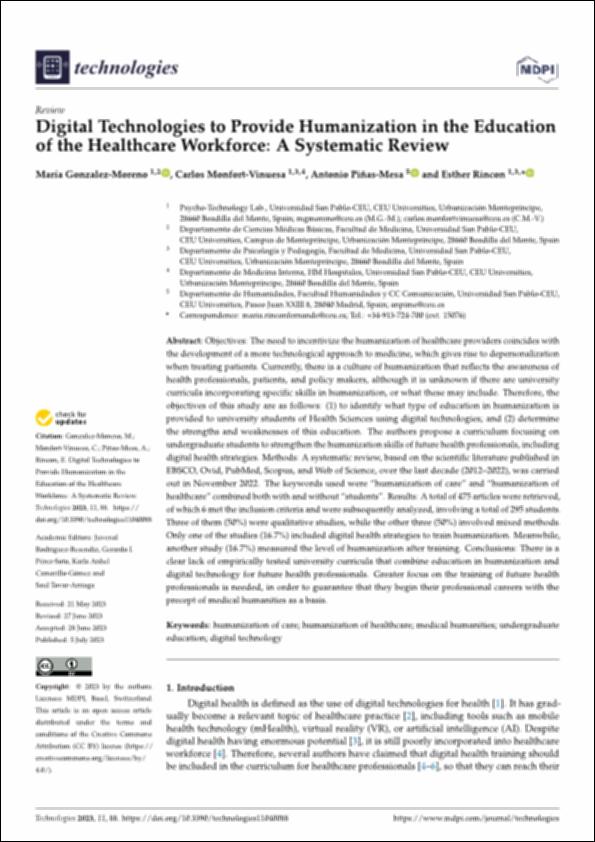Por favor, use este identificador para citar o enlazar este ítem:
http://hdl.handle.net/10637/14880Digital Technologies to Provide Humanization in the Education of the Healthcare Workforce: A Systematic Review
| Título : | Digital Technologies to Provide Humanization in the Education of the Healthcare Workforce: A Systematic Review |
| Autor : | González Moreno, María Monfort Vinuesa, Carlos Piñas Mesa, Antonio Rincón Fernández, María Esther |
| Materias: | Humanization of care; Humanization of healthcare; Medical humanities; Undergraduate education; Digital technology |
| Editorial : | MDPI |
| Citación : | Gonzalez-Moreno, M.; Monfort-Vinuesa, C.; Piñas-Mesa, A.; Rincon, E. Digital Technologies to Provide Humanization in the Education of the Healthcare Workforce: A Systematic Review. Technologies 2023, 11, 88. https://doi.org/10.3390/technologies11040088 |
| Resumen : | Objectives: The need to incentivize the humanization of healthcare providers coincides with the development of a more technological approach to medicine, which gives rise to depersonalization when treating patients. Currently, there is a culture of humanization that reflects the awareness of health professionals, patients, and policy makers, although it is unknown if there are university curricula incorporating specific skills in humanization, or what these may include. Therefore, the objectives of this study are as follows: (1) to identify what type of education in humanization is provided to university students of Health Sciences using digital technologies; and (2) determine the strengths and weaknesses of this education. The authors propose a curriculum focusing on undergraduate students to strengthen the humanization skills of future health professionals, including digital health strategies. Methods: A systematic review, based on the scientific literature published in EBSCO, Ovid, PubMed, Scopus, andWeb of Science, over the last decade (2012–2022), was carried out in November 2022. The keywords used were “humanization of care” and “humanization of healthcare” combined both with and without “students”. Results: A total of 475 articles were retrieved, of which 6 met the inclusion criteria and were subsequently analyzed, involving a total of 295 students. Three of them (50%) were qualitative studies, while the other three (50%) involved mixed methods. Only one of the studies (16.7%) included digital health strategies to train humanization. Meanwhile, another study (16.7%) measured the level of humanization after training. Conclusions: There is a clear lack of empirically tested university curricula that combine education in humanization and digital technology for future health professionals. Greater focus on the training of future health professionals is needed, in order to guarantee that they begin their professional careers with the precept of medical humanities as a basis. |
| URI : | http://hdl.handle.net/10637/14880 |
| Derechos: | http://creativecommons.org/licenses/by-nc-nd/4.0/deed.es OpenAccess |
| ISSN : | 2227-7080 |
| Fecha de publicación : | 5-jul-2023 |
| Centro : | Universidad San Pablo-CEU |
| Aparece en las colecciones: | Psicología |
Los ítems de DSpace están protegidos por copyright, con todos los derechos reservados, a menos que se indique lo contrario.


